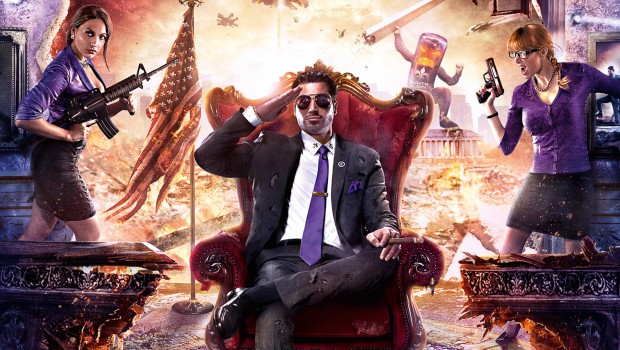Saints Row IV: Everything is Permitted
 Saints Row IV doesn’t go to 11. Saints Row IV starts at 11 and finishes up somewhere north of eleventy billion. If nothing succeeds like excess, then Saints Row IV is the greatest accomplishment in all of human history. The evolution of the Saints Row series, like biological evolution, is terrifying to behold. A franchise that started out poorly copying Grand Theft Auto quickly discovered what worked (insane set pieces, clever writing, player freedom) and what didn’t (poorly copying Grand Theft Auto). Saints Row 2 introduced a seed of craziness into the sandbox crime drama, but it was Saints Row: The Third that found the series’ distinct over-the-top voice: smart, perverse, and more than a little unhinged. Saints Row IV is the step beyond that. Evolutionarily speaking, Saints Row IV is the transhumanist singularity of hitting people in the face with a purple dildo.
Saints Row IV doesn’t go to 11. Saints Row IV starts at 11 and finishes up somewhere north of eleventy billion. If nothing succeeds like excess, then Saints Row IV is the greatest accomplishment in all of human history. The evolution of the Saints Row series, like biological evolution, is terrifying to behold. A franchise that started out poorly copying Grand Theft Auto quickly discovered what worked (insane set pieces, clever writing, player freedom) and what didn’t (poorly copying Grand Theft Auto). Saints Row 2 introduced a seed of craziness into the sandbox crime drama, but it was Saints Row: The Third that found the series’ distinct over-the-top voice: smart, perverse, and more than a little unhinged. Saints Row IV is the step beyond that. Evolutionarily speaking, Saints Row IV is the transhumanist singularity of hitting people in the face with a purple dildo.
Someone asked me, “Is the humor in Saints Row just a bunch of crude dick jokes? Or is the writing actually clever?” The answer is “yes.” The answer is always “yes.” Saints Row is a game that is incapable of telling the player “no.” It’s like a rich uncle that can’t stop spoiling its favorite nephew – or hide its excited grin. I’d call it an embarrassment of riches, if it had the common decency to be embarrassed. But Saints Row IV doesn’t waste precious clock cycles apologizing for itself. More than anything else, it’s proud of what it’s become. As Volition’s first developer diary told us, “It takes a lot of work to make something this beautifully stupid.”
 It reminds me of another overstuffed, insanely ambitious project: Grant Morrison’s The Invisibles. The Invisibles is Morrison’s Unified Theory of Everything, combining Buddhist thought, post-human technological singularities, reality-altering fiction, alien abductions, time travel, the Marquis de Sade, Haitian Vodou, government conspiracies, onanistic ritual, the simultaneity of all things, the British Royal Family…everything, all right? It’s a mess, but a glorious one, full of ideas and momentum and joie de vivre; excitement and adventure and really wild things. It’s too busy being awesome and moving on to the next set piece to get hung up on whether or not it all fits together. (Though it does. Mostly.)
It reminds me of another overstuffed, insanely ambitious project: Grant Morrison’s The Invisibles. The Invisibles is Morrison’s Unified Theory of Everything, combining Buddhist thought, post-human technological singularities, reality-altering fiction, alien abductions, time travel, the Marquis de Sade, Haitian Vodou, government conspiracies, onanistic ritual, the simultaneity of all things, the British Royal Family…everything, all right? It’s a mess, but a glorious one, full of ideas and momentum and joie de vivre; excitement and adventure and really wild things. It’s too busy being awesome and moving on to the next set piece to get hung up on whether or not it all fits together. (Though it does. Mostly.)
 It’s also the unsung inspiration behind the Wachowskis’ Matrix, where Morrison’s work was passed around on set as both visual and narrative reference. Like Neo, the Boss is trapped in a virtual simulation of Steelport. Like Neo, the Boss learns to think outside the boundaries of the simulation to gain superpowers and take the fight to humanity’s oppressors. But in The Invisibles, it’s the real world – the prison of things – that keeps people from reaching their potential. Superhuman powers aren’t just a digital metaphor, they’re what happen when you break free from the self-imposed restraints of the material plane – when you understand that “nothing is true; everything is permitted” isn’t just a catchphrase, but an accurate description of the underlying reality of the universe.
It’s also the unsung inspiration behind the Wachowskis’ Matrix, where Morrison’s work was passed around on set as both visual and narrative reference. Like Neo, the Boss is trapped in a virtual simulation of Steelport. Like Neo, the Boss learns to think outside the boundaries of the simulation to gain superpowers and take the fight to humanity’s oppressors. But in The Invisibles, it’s the real world – the prison of things – that keeps people from reaching their potential. Superhuman powers aren’t just a digital metaphor, they’re what happen when you break free from the self-imposed restraints of the material plane – when you understand that “nothing is true; everything is permitted” isn’t just a catchphrase, but an accurate description of the underlying reality of the universe.
Like many cosmic morality tales, The Invisibles starts by dividing its players into the forces of Order and Chaos. But in an inversion of the usual trope, Order is “bad” – restrictive, controlling, conformist, and static – while Chaos is “good” – creative, expressive, unpredictable, and free. Their clash defines the universe. Videogames, too, are a struggle between these two forces: the Order imposed by the game designer onto the world, the Chaos of the player’s unpredictable actions. Here, too, their clash creates the universe. But Saints Row, like the Invisibles, comes down firmly on the side of Chaos – of unbridled player freedom.
 So many games are about imposing limits; keeping the player on a set path with a well-defined skill set; literally ensuring the player can never go “off the rails.” But Saints Row is about breaking boundaries, pushing limits, and reaching for some unobtainable maximality. The Boss starts the game as the President of the United States of America (with superpowers!) yet begins jockeying for greater status immediately. The player is always free to explore the world, develop their character, and experiment with systems according to their own pace and style. There’s no idea so crazy that Volition won’t add it to the mix just to see what you will do with it.
So many games are about imposing limits; keeping the player on a set path with a well-defined skill set; literally ensuring the player can never go “off the rails.” But Saints Row is about breaking boundaries, pushing limits, and reaching for some unobtainable maximality. The Boss starts the game as the President of the United States of America (with superpowers!) yet begins jockeying for greater status immediately. The player is always free to explore the world, develop their character, and experiment with systems according to their own pace and style. There’s no idea so crazy that Volition won’t add it to the mix just to see what you will do with it.
A peevish IGN review misses the point rather spectacularly:
Why do I need gun upgrades when I can shoot fireballs from my hands?
Why should I bother summoning homies to help me in combat when I can throw tanks with my mind?
What good are customizable cars with afterburners when they only slow me down?
The obvious answer is: because you CAN! Because it’s COOL! Because it’s FUN! Saints Row IV isn’t difficult, but when my friends and I are out looking for a great party, “difficult” is rarely high on our list of entrance criteria. And while it’s true Saints Row IV contains several vestigial systems you may never use, that’s evolution for you. (Also: a fighter jet shaped like an all-American Screaming Eagle is much cooler than a spleen.)
 Even so, it’s an interesting question: why do some people find it so bothersome that Saints Row IV contains contradictory gameplay systems? Cars and super sprinting, planes and super flight, guns and super powers. Why can’t it just be one or the other, street or superpowered? To answer this question, we need to take a closer look at the idea of canon.
Even so, it’s an interesting question: why do some people find it so bothersome that Saints Row IV contains contradictory gameplay systems? Cars and super sprinting, planes and super flight, guns and super powers. Why can’t it just be one or the other, street or superpowered? To answer this question, we need to take a closer look at the idea of canon.
Canon is a relatively new concept, but one which inspires Internet holy wars every day: the idea that some stories count – and some stories don’t. Were Batman’s parents shot by the Joker, or by a mugger named Joe Chill? Joss Whedon wrote the Fray comic – does that make it canon? Is it less canonical than the Buffy TV show? Star Wars has the Holocron, with its five holographic levels of overlapping canonicity; everything is canon, but some things are more canon than others. The question on many fans’ minds is never “is it good?” or “is it interesting?” but “is it canon?”
 Games are burdened by not just narrative canon, but an additional layer of mechanical canon. Do the gameplay mechanics make sense for the game universe? Are the mechanics consistent with previous games in the franchise? Could Lara Croft really survive being shot by a crossbow bolt? Why do RPG characters who die in battle repeatedly sometimes die “for real” when the story demands it? And could a street-level thug who started out hustling on the streets of Stilwater, MI really become the President of the United States of America? Put another way, Saints Row started out as a crime game about taking corners and pushing product. Now it’s a galactic-level Mass Effect parody with Crackdown-style superpowers. How does this make any sense at all?
Games are burdened by not just narrative canon, but an additional layer of mechanical canon. Do the gameplay mechanics make sense for the game universe? Are the mechanics consistent with previous games in the franchise? Could Lara Croft really survive being shot by a crossbow bolt? Why do RPG characters who die in battle repeatedly sometimes die “for real” when the story demands it? And could a street-level thug who started out hustling on the streets of Stilwater, MI really become the President of the United States of America? Put another way, Saints Row started out as a crime game about taking corners and pushing product. Now it’s a galactic-level Mass Effect parody with Crackdown-style superpowers. How does this make any sense at all?
 It doesn’t, and Saints Row IV doesn’t care. It simply does not care. Saints Row IV lets your protagonist (male/female/other) romance any other crew member (male/female/other). Hell, Saints Row lets you romance every other crew member. Go for it, man! Did you prefer Saints Row 2 or Saints Row: The Third? The game is full of love for both the second game’s dark humor and gangland drama and the third’s over-the-top psychosis. Some fans didn’t like how Shaundi’s characterization has changed over the series. Volition’s answer is to give the game two Shaundis: New Shaundi and Shaundi Classic. Choose your favorite. Choose both. Choose neither. But it’s your choice, so choose!
It doesn’t, and Saints Row IV doesn’t care. It simply does not care. Saints Row IV lets your protagonist (male/female/other) romance any other crew member (male/female/other). Hell, Saints Row lets you romance every other crew member. Go for it, man! Did you prefer Saints Row 2 or Saints Row: The Third? The game is full of love for both the second game’s dark humor and gangland drama and the third’s over-the-top psychosis. Some fans didn’t like how Shaundi’s characterization has changed over the series. Volition’s answer is to give the game two Shaundis: New Shaundi and Shaundi Classic. Choose your favorite. Choose both. Choose neither. But it’s your choice, so choose!
It’s not just that the gameplay is chaotic; the narrative itself is willfully obtuse and self-contradicting. Volition ignores canon because canon is boring. Ultimately, canon adds nothing to the experience; canon can only take away. And Saints Row will be damned before it takes anything away from the player for any reason at all.
Put another way, consider this exchange from the Doctor Who novel The Gallifrey Chronicles:
“Sherlock Holmes solved the case before I could, as I recall.”
“Sherlock Holmes is a fictional character,” Trix pointed out.
The Doctor grinned. “My dear, one of the things you’ll learn is that it’s all real. Every word of every novel is real, every frame of every movie, every panel of every comic strip.”
“But that’s just not possible. I mean some books contradict other ones and -”
The Doctor was ignoring her.
Doctor Who is a particularly rich example; during the several years the series was off the air, the franchise evolved in a number of exciting and contradictory directions in a number of novels and radio plays. Ultimately, however, the show came back to television and the more unusual toys had to be put back in the box. When author Lawrence Miles was told the stories he’d been writing for several years were to be excised as anathema before the show returned to air, his solution was to write his own original series that included, as a subset, all of Doctor Who continuity. The canvas can always be expanded; the story can always include more.
 When faced with rationalizing 50 years of tangled DC continuity, Mark Waid and Grant Morrison came up with the idea of Hypertime. The basic premise of Hypertime is simple: “It’s all true.” Forget about canon, fanon, or anything in between – every story ever told is equally valid. The world is big enough for more than one Superman. That same inclusive exuberance is at the heart of Saints Row IV. Every game begins as a world where anything is possible. But Volition committed themselves to delivering as much of that possibility as they could. They didn’t just bring comic book superpowers to the world of Steelport. They brought the complexity, morality, and sweeping scope of the best genre fiction, too. With its no-holds-barred approach to narrative, gameplay mechanics, and player freedom, Saints Row IV is a resounding, empowering punch to the face of the modern games industry. Don’t settle for less because it’s safe. Run faster. Jump higher. And remember: when everything is true, only then is everything is truly permitted.
When faced with rationalizing 50 years of tangled DC continuity, Mark Waid and Grant Morrison came up with the idea of Hypertime. The basic premise of Hypertime is simple: “It’s all true.” Forget about canon, fanon, or anything in between – every story ever told is equally valid. The world is big enough for more than one Superman. That same inclusive exuberance is at the heart of Saints Row IV. Every game begins as a world where anything is possible. But Volition committed themselves to delivering as much of that possibility as they could. They didn’t just bring comic book superpowers to the world of Steelport. They brought the complexity, morality, and sweeping scope of the best genre fiction, too. With its no-holds-barred approach to narrative, gameplay mechanics, and player freedom, Saints Row IV is a resounding, empowering punch to the face of the modern games industry. Don’t settle for less because it’s safe. Run faster. Jump higher. And remember: when everything is true, only then is everything is truly permitted.
One Response to Saints Row IV: Everything is Permitted
Leave a Reply
You must be logged in to post a comment.







Fantastic article! I just recently discovered the joy that is doing whatever I want in Saints Row IV and this nailed it.